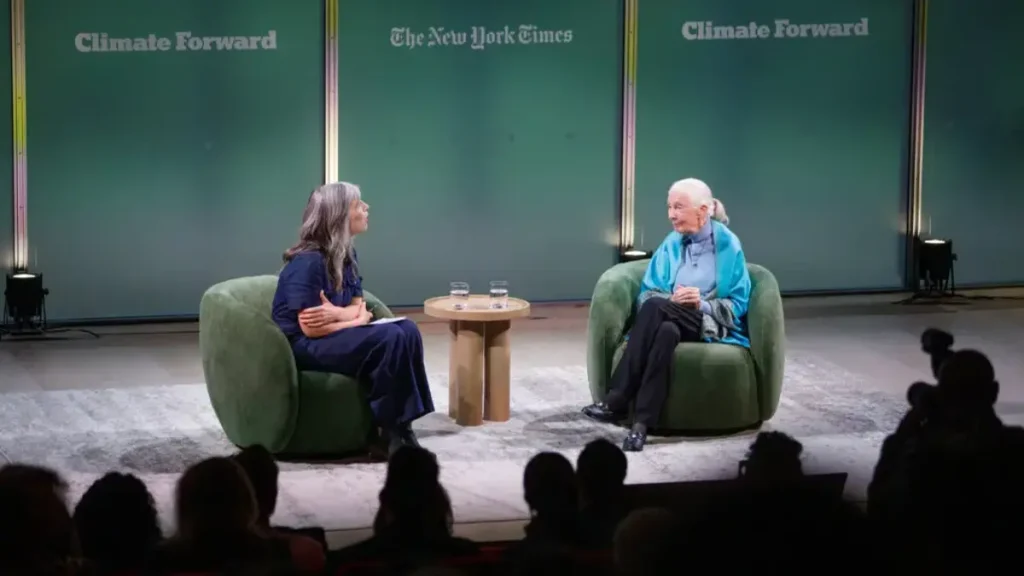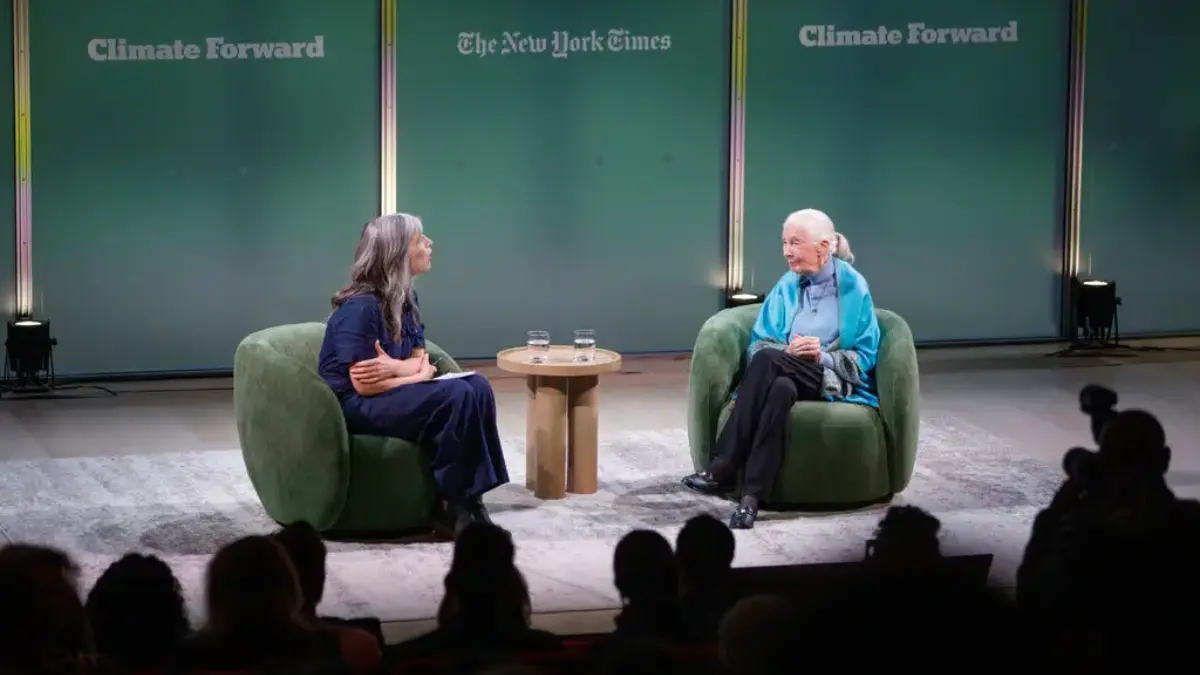Who is Jane Goodall? Discover the inspiring story of Jane Goodall’s life, her groundbreaking research on chimpanzees, global conservation efforts, and her lasting legacy in wildlife preservation.
Who is Jane Goodall? Life, Research, and Global Impact

When people ask “Who is Jane Goodall”, the answer is far more than just a name. Jane Goodall is a world-renowned primatologist, ethologist, anthropologist, and conservationist. She revolutionized our understanding of chimpanzees, reshaped how humans view animals, and continues to inspire global conservation movements.
Her life’s work has not only advanced science but also ignited hope for protecting endangered species and the environment. Let’s explore in detail who is Jane Goodall, her biography, scientific contributions, activism, and legacy.
Early Life of Jane Goodall
To understand who is Jane Goodall, it’s important to look at her childhood and formative years.
| Detail | Information |
|---|---|
| Full Name | Valerie Jane Morris-Goodall |
| Date of Birth | April 3, 1934 |
| Birthplace | London, England |
| Nationality | British |
| Field | Primatology, Ethology, Anthropology |
| Known For | Groundbreaking study of wild chimpanzees in Gombe Stream National Park |
Jane Goodall’s love for animals began in her early childhood. Her fascination with nature was nurtured by her family, and she dreamed of working in Africa to study animals. Despite having no formal university degree at first, her determination eventually led her to meet anthropologist Louis Leakey, who would change her life forever.
Who is Jane Goodall in the World of Science?
When people ask, “Who is Jane Goodall in science?”, the answer is clear: she is a pioneer. She began her field research in 1960 at Gombe Stream National Park in Tanzania, observing wild chimpanzees in their natural habitat.
Her discoveries changed scientific thought:
- Chimpanzees use tools, such as sticks to extract termites.
- They show complex emotions, including grief, joy, and empathy.
- They have strong social bonds and cultural behaviors.
These findings blurred the line between humans and animals, challenging the belief that only humans could make tools and display culture.
Jane Goodall’s Groundbreaking Discoveries
| Discovery | Impact |
|---|---|
| Tool Use in Chimpanzees | Redefined human uniqueness |
| Chimpanzee Emotions | Proved animals have complex inner lives |
| Social Hierarchy | Revealed organized group dynamics |
| Hunting Behavior | Showed chimpanzees as meat-eaters, not just fruit-eaters |
Her research transformed not only primatology but also philosophy, ethics, and conservation science. Who is Jane Goodall if not the woman who taught humanity that animals are more like us than we ever imagined?
Jane Goodall’s Activism and Global Work
To answer who is Jane Goodall today, one must look beyond her scientific research. Over the decades, she evolved into a leading global environmental activist.
She founded:
- The Jane Goodall Institute (1977) – focusing on conservation, research, and community-centered programs.
- Roots & Shoots (1991) – a youth-led program in more than 100 countries, inspiring young people to protect wildlife and the environment.
Her activism spans:
- Wildlife conservation
- Climate change awareness
- Ending animal testing and captivity
- Promoting sustainable development
Who is Jane Goodall to the World Today?
At 91 years old (as of 2025), Jane Goodall is more active than ever, traveling, giving lectures, writing books, and inspiring new generations. She has received countless awards, including:
- Dame Commander of the Order of the British Empire (DBE)
- Templeton Prize
- UN Messenger of Peace
Her legacy is not just scientific—it’s deeply humanitarian. Who is Jane Goodall if not a bridge between humans and animals, urging us to live in harmony with nature?
Timeline of Jane Goodall’s Life
| Year | Milestone |
|---|---|
| 1934 | Born in London, England |
| 1957 | Travels to Kenya, meets Louis Leakey |
| 1960 | Begins chimpanzee research in Gombe |
| 1965 | Earns PhD in Ethology from Cambridge University |
| 1977 | Establishes Jane Goodall Institute |
| 1991 | Launches Roots & Shoots program |
| 2002 | Named UN Messenger of Peace |
| 2025 | Continues global activism |
The Philosophy of Jane Goodall
When people ask, “Who is Jane Goodall in philosophy and ethics?”, the answer lies in her worldview:
- Every creature has value.
- Humans must respect the interconnectedness of all life.
- Hope is a vital force for change.
Her philosophy blends science with compassion, urging the world to protect nature before it’s too late.
Books and Publications by Jane Goodall
Jane Goodall has written extensively about her life and research. Some of her most famous works include:
- In the Shadow of Man (1971)
- The Chimpanzees of Gombe (1986)
- Reason for Hope (1999)
- The Book of Hope (2021)
These books not only answer who is Jane Goodall but also inspire readers to rethink humanity’s relationship with animals.
Who is Jane Goodall in Popular Culture?
Jane Goodall has become a cultural icon. She has appeared in documentaries, interviews, and even animated shows. Her life and work are celebrated worldwide, symbolizing kindness, resilience, and dedication.
From school classrooms to conservation campaigns, her name represents more than science—it represents hope.
Challenges Faced by Jane Goodall
Even legends face struggles. Jane Goodall encountered:
- Skepticism from scientists early in her career.
- Difficulties as a woman in a male-dominated field.
- Harsh field conditions in Gombe.
- Criticism from some animal rights groups for her methods.
Yet, she persisted and proved that passion, patience, and perseverance can change the world.
Why Jane Goodall Still Matters
So, who is Jane Goodall to future generations? She is a symbol of hope, reminding us that every action counts in protecting the Earth. Her message continues to inspire students, scientists, and activists worldwide.
She shows us that one person’s dedication can create a global movement.
FAQs on Who is Jane Goodall
Q1: Who is Jane Goodall?
Jane Goodall is a British primatologist, ethologist, and conservationist, famous for her pioneering chimpanzee research in Tanzania.
Q2: Why is Jane Goodall famous?
She is known for discovering that chimpanzees use tools, show emotions, and have complex societies, reshaping our understanding of animals.
Q3: What organizations did Jane Goodall found?
She founded the Jane Goodall Institute and Roots & Shoots, both dedicated to conservation and education.
Q4: Who is Jane Goodall in modern activism?
Today, she is a global voice for climate change action, wildlife protection, and youth empowerment.
Q5: What awards has Jane Goodall won?
She has received over 40 international awards, including being named a UN Messenger of Peace.
Q6: Is Jane Goodall still alive?
Yes, she continues her activism and public speaking well into her 90s.
Q7: What books has Jane Goodall written?
Her famous books include In the Shadow of Man and The Book of Hope.
Q8: Who is Jane Goodall to the scientific community?
She is a pioneer who expanded primatology and challenged humanity’s perception of animals.
Q9: How did Jane Goodall change the world?
She redefined the human-animal connection and inspired conservation movements across the globe.
Q10: What is Jane Goodall’s lasting legacy?
Her legacy is a blend of scientific discovery, humanitarian work, and a global call to protect nature.
Conclusion
The question “Who is Jane Goodall” leads to a story of courage, vision, and dedication. She is a scientist, conservationist, activist, and role model who has changed the way humanity views the natural world. Her impact stretches from the jungles of Tanzania to classrooms, parliaments, and communities worldwide.
Her life proves that passion and perseverance can ignite global change—and her work will continue to inspire generations for centuries to come.

